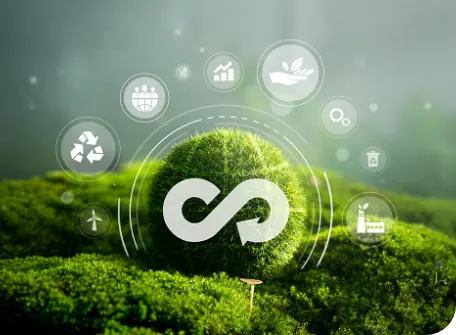Energy Management|GHG Emission Reduction | Air Emissions | Water Conservation | Waste Management
of energy consumed
of water consumed
of green energy
of water recycled
Sustainability for us is a continuous journey rather than a final destination. We firmly believe in fostering a culture of excellence and sustainability across all our operations. Our commitment to quality, environmental responsibility, occupational health and safety, and energy management is encapsulated in our robust Integrated Management Systems (IMS). These systems, built upon internationally recognised standards such as ISO 9001:2015, ISO 14001:2015, ISO 45001:2018, and ISO 50001:2018, serve as the cornerstone of our operational framework.
We are dedicated to optimising our energy consumption throughout our operations with a strong commitment to minimise our carbon footprint. We prioritise the implementation of robust energy management procedures and systems, and we actively adopt innovative solutions to reduce energy usage, improve operational efficiency, and increase the share of renewable energy in our energy mix.
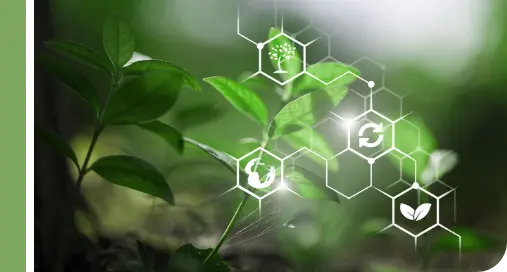
Technical Textiles Business procured
of renewable energy through group captive power plants.
Chemical Business, Dahej : Increase in procurement of renewable energy from 2,375 MWh in FY 2022-23 to
in FY 2023-24.
electricity from renewable sources
We are implementing efforts to expand our renewable power portfolio by implementing solar power generation projects and entering into power purchase agreements with third-party agencies.
In FY 2023-24, our renewable energy and biomass consumption accounts for
Our business-wise total energy savings
Chemicals
Packaging Films
Technical Textiles
Coated Fabrics
Refer principle 6, Essential indicators for more details.
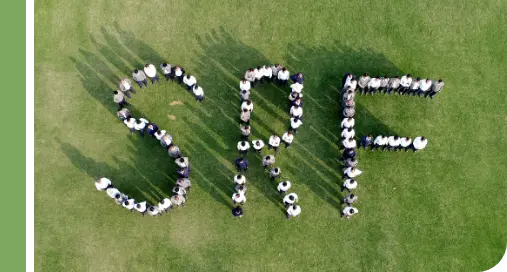
Our GHG inventory consists of Scope I & Scope II emissions. Inventorisation has been done in line with the GHG Protocol Corporate Accounting and Reporting Standard. Through transparency, accountability, and continuous improvement, we are committed to playing our part in mitigating climate change and building a more sustainable future for all. We have implemented a number of energy efficiency measures across our operations to reduce our GHG footprint. We are also focussing on reducing our dependency on fossil fuels and increasing the share of renewable energy in our portfolio.
We are the first chemical company in India to obtain the ISO 14064-1:2006 certification for verification of our greenhouse gas emissions. In accordance with international norms, we have completely stopped the production of halons and phased out Chlorofluorocarbons (CFC) from our operations and are now investing in newer, more sustainable technologies.
We track the air pollutants originating from our operations. We have systematically implemented monitoring mechanisms on essential utilities, including boilers and diesel generators to ensure that the release of these pollutants is not only under strict surveillance but is also consistently regulated to meet environmental safety standards. The comprehensive monitoring regime is testament to our initiative in keeping emission levels significantly below the stipulated thresholds, thereby minimising our ecological impact and contributing positively to community well-being.
In our facilities, we are dedicated to consistently enhancing our water conservation efforts to minimise our freshwater consumption. We achieve this by incorporating a range of water-saving technologies and practices, such as the use of recycled and reused treated wastewater in our operations, and by adopting rainwater harvesting strategies. Furthermore, we have established seawater desalination plant in collaboration with local authorities for use in our plant at Dahej, Gujarat, which will further diminish our reliance on freshwater supplies. Our factories are equipped with advanced wastewater treatment systems that ensure our discharged water complies with the regulatory standards set by the relevant Pollution Control Boards. The condition of the treated water discharged into the environment is regularly assessed by independent external agencies.
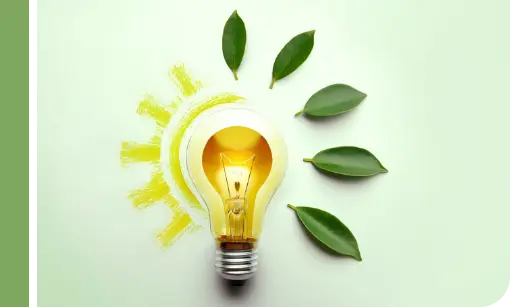
In line with our commitments on water conservation, this year we have commissioned 2,200 KLD reverse osmosis plant to recycle process wastewater. Additionally, we have
reverse osmosis plant was installed in Dahej facility
We have waste management procedures in place which takes into account all the waste being generated and its responsible management on site. We actively monitor, minimise, reuse, and recycle the waste generated from our operations. We adhere to local laws and regulations when disposing of both hazardous and non-hazardous waste originating from our manufacturing sites.
Few initiatives taken by the SRF to minimize the waste:
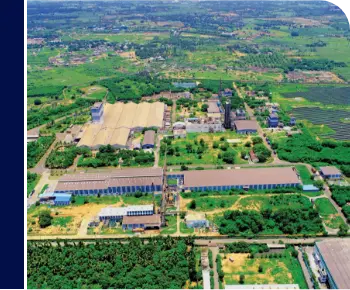
SRF acquired the facility with its purchase of DuPont subsidiary DuPont Fibres Ltd (DFL) in September 2000 and renamed it Tyre Cord Fabric Ltd.
As a socially conscious organisation, we understand the significance of preserving biodiversity in the vicinity of our business units, and we are steadfast in our commitment to achieving this goal. Through various initiatives, including partnerships with local schools as part of our CSR programmes, we actively contribute to biodiversity conservation efforts. Moreover, we emphasise the importance of fostering awareness about biodiversity conservation among all stakeholders.
We collaborate with local communities, schools, and NGOs to promote environmental education and consciousness. Additionally, we encourage our employees to engage in activities aimed at conserving biodiversity, such as tree plantation drives and awareness campaigns. By fostering a culture of environmental stewardship, we aim to make a meaningful impact on biodiversity preservation.
